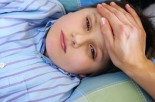Cancer strikes more than 9,000 children a year, making it important to pay attention to your child's possible symptoms.
Cancers in children and adolescents belong mainly to four groups: leukemias, lymphomas, sarcomas and gliomas.
Fever, chills, appetite loss, aching bones or joints are just some of the symptoms that could be signs of cancer in your child.
The following mnemonic was developed by the American Cancer Society to help clinicians remember the early warning signs of childhood cancer.
? Continued, unexplained weight loss
? Headaches with vomiting in the morning
? Increased swelling or persistent pain in bones or joints, sometimes accompanied by limping
? Lump or mass in abdomen, neck, or elsewhere
? Development of a whitish appearance in the pupil of the eye or sudden changes in vision
? Recurrent fevers not caused by infections
? Excessive bruising or bleeding (often sudden)
? Noticeable paleness or prolonged tiredness
Listen in as Dr. Kathleen Neville discusses how to recognize symptoms in your child that could indicate the presence of cancer.
Selected Podcast
Children's Cancer Risk: Don't Ignore These Symptoms

Featuring:
 Kathleen Neville, M.D., M.S. is board certified in pediatrics, pediatric hematology/oncology and clinical pharmacology and received her Master of Science degree in Clinical Research from Indiana University. She has significant clinical trials expertise (e.g., study design, execution, data analysis) and translational research experience (e.g., PG/PK/PD and development of non-invasive PD surrogate endpoints). Dr. Neville has also been appointed to serve on the pediatric subcommittee of the FDA’s Oncologic Drugs Advisory Committee and the FDA's Committee on Clinical Pharmacology. She also currently serves as Chair for the American Academy of Pediatrics Committee on Drugs. Dr. Neville also currently serves as Chair for the NICHD funded Pediatric Trials multicenter trial to evaluate the pharmacokinetics and relative bioavailability of a liquid formulation of hydroxyurea. Dr. Neville’s research interests relate to the early phase (Phase I/II) study of medications in children, characterizing the determinants of variability in drug disposition and response, and development of pediatric appropriate formulations.
Kathleen Neville, M.D., M.S. is board certified in pediatrics, pediatric hematology/oncology and clinical pharmacology and received her Master of Science degree in Clinical Research from Indiana University. She has significant clinical trials expertise (e.g., study design, execution, data analysis) and translational research experience (e.g., PG/PK/PD and development of non-invasive PD surrogate endpoints). Dr. Neville has also been appointed to serve on the pediatric subcommittee of the FDA’s Oncologic Drugs Advisory Committee and the FDA's Committee on Clinical Pharmacology. She also currently serves as Chair for the American Academy of Pediatrics Committee on Drugs. Dr. Neville also currently serves as Chair for the NICHD funded Pediatric Trials multicenter trial to evaluate the pharmacokinetics and relative bioavailability of a liquid formulation of hydroxyurea. Dr. Neville’s research interests relate to the early phase (Phase I/II) study of medications in children, characterizing the determinants of variability in drug disposition and response, and development of pediatric appropriate formulations.
Kathleen A. Neville, MD
 Kathleen Neville, M.D., M.S. is board certified in pediatrics, pediatric hematology/oncology and clinical pharmacology and received her Master of Science degree in Clinical Research from Indiana University. She has significant clinical trials expertise (e.g., study design, execution, data analysis) and translational research experience (e.g., PG/PK/PD and development of non-invasive PD surrogate endpoints). Dr. Neville has also been appointed to serve on the pediatric subcommittee of the FDA’s Oncologic Drugs Advisory Committee and the FDA's Committee on Clinical Pharmacology. She also currently serves as Chair for the American Academy of Pediatrics Committee on Drugs. Dr. Neville also currently serves as Chair for the NICHD funded Pediatric Trials multicenter trial to evaluate the pharmacokinetics and relative bioavailability of a liquid formulation of hydroxyurea. Dr. Neville’s research interests relate to the early phase (Phase I/II) study of medications in children, characterizing the determinants of variability in drug disposition and response, and development of pediatric appropriate formulations.
Kathleen Neville, M.D., M.S. is board certified in pediatrics, pediatric hematology/oncology and clinical pharmacology and received her Master of Science degree in Clinical Research from Indiana University. She has significant clinical trials expertise (e.g., study design, execution, data analysis) and translational research experience (e.g., PG/PK/PD and development of non-invasive PD surrogate endpoints). Dr. Neville has also been appointed to serve on the pediatric subcommittee of the FDA’s Oncologic Drugs Advisory Committee and the FDA's Committee on Clinical Pharmacology. She also currently serves as Chair for the American Academy of Pediatrics Committee on Drugs. Dr. Neville also currently serves as Chair for the NICHD funded Pediatric Trials multicenter trial to evaluate the pharmacokinetics and relative bioavailability of a liquid formulation of hydroxyurea. Dr. Neville’s research interests relate to the early phase (Phase I/II) study of medications in children, characterizing the determinants of variability in drug disposition and response, and development of pediatric appropriate formulations. Transcription: